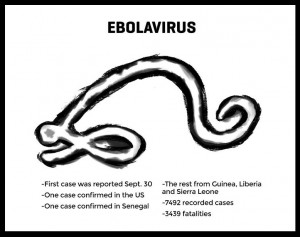Following the isolated treatment of a doctor in Worcester, Massachusetts public health officials reassured residents that there are no cases of Ebola in the Commonwealth but they are well prepared to handle a potential outbreak.
“The public can have full confidence that our hospitals have the expertise, preparedness and capacity to handle such a situation. The infectious disease controls in Massachusetts and the United States are world class,” said Anne Roach, a spokeswoman at the Massachusetts Department of Public Health, in an email.
As of Sept. 30, a total of 7,492 cases of Ebola have been confirmed across the globe, with concentrations in Guinea, Liberia and Sierra Leone. The first confirmed case of Ebola in the United States appeared in Dallas, according to the Centers for Disease Control and Prevention.
The DPH has worked closely with health care facilities, doctors and emergency service providers to give them the means to address the situation, Roach said.
“Should a patient present Ebola symptoms, the patient would be quickly isolated and treated to prevent the spread of this disease,” she said. “Ebola is not spread easily… [It] is transmitted through direct contact with the bodily fluids of a sick person, including exposure to contaminated objects, such as needles.”
Symptoms of Ebola include fever, pain and unexplained hemorrhage, according to the CDC.
The National Emerging Infectious Diseases Laboratories, affiliated with Boston University and located near the BU Medical Campus, researches infectious diseases such as Ebola to develop vaccines and improve treatment.
Ronald Corley, director of NEIDL and a professor of microbiology, said people are afraid of the global Ebola outbreak because they do not know much about the disease.
“Ebola is a scary disease because there’s a lot more in science fiction, and it’s a disease that can be up to 90 percent deadly if you catch it,” he said. “As far as anyone knows from the number of people that have recovered from Ebola so far, once they have recovered from the disease, they are immune to it.”
With diseases such as Ebola, finding a diagnosis earlier on is key to providing better patient care, Corley said.
“The big compelling thing is developing new technologies to diagnose patients before they have symptoms,” he said. “If you can do that, it’s a game changer for the way you would handle an outbreak like this, and it would protect an awful lot of people.”
Global Programs, the department responsible for BU Study Abroad, coordinates with U.S. authorities and Student Health Services to ensure the well being of students, said spokeswoman Gail Davis.
“There are currently no programs operating in the affected areas of West Africa. We don’t foresee any changes to Study Abroad operations this semester or for spring semester,” she said in an email. “We make an effort to ensure that our students are informed and prepared.”

Several residents said with the abundance of universities and hospitals in the Commonwealth to combat an outbreak, they feel they are in good hands.
Evan Bailey, a senior in the College of Arts and Sciences, said based on previous infectious disease scares in Massachusetts, necessary procedures are already in place to protect people.
“It’s not exactly like [the virus] is a first time thing,” he said. “This kind of thing has been done before, and there are procedures that exist to keep these kinds of things contained.”
Colby Alexander, 28, of Dorchester, said based on how well the country is doing to address Ebola, he is not concerned about the disease.
“There are so many other things in this country that are going so wrong, and it’s just not on my list when it comes to that,” he said. “I feel like the people affected were Americans that had a good heart and went to help other people in a different country, and that’s just one of the risks you take when you are doing something like that.”
Allan Travaglione, a freshman in CAS, said based on how the CDC and government has handled the outbreak, he hopes medical facilities will continue to operate on high alert.
“I would hope that they would just amp up whatever they have now and take precaution,” he said. “It’s just a matter of educating the people and informing them of what they’re up against and really minimizing the effect it will have on the population.”






















































































































